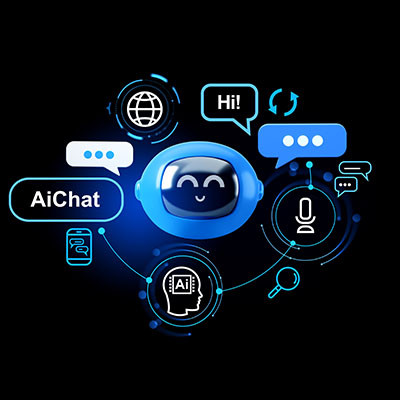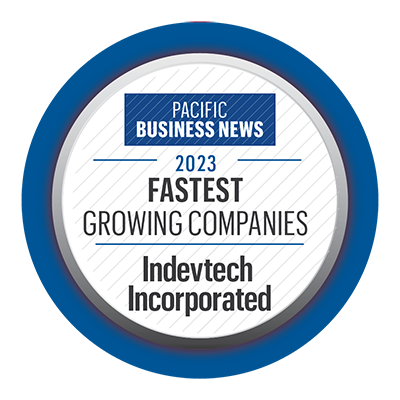Indevtech Blog
Microsoft Copilot - What Business Owners Need to Know
AI is, by a landslide, the technology of the year. It was just a matter of time before Microsoft introduced their own enterprise-ready AI platform, and just like the launch of most emerging technologies, there is a lot of confusion and unanswered questions, so let’s talk about what Copilot is, and go over some things you should know as a business owner.
What is Microsoft Copilot?
Microsoft Copilot is the software giant’s latest digital assistant. If you remember Cortana from a few years ago that was bundled with Windows 10 and then quietly removed a few months ago, Copilot is supposed to be the next big thing. Years ago, we were promised that Cortana was going to integrate with Microsoft Office products in interesting new ways, be an interface for Microsoft’s enterprise Power BI solutions, and have tons of really high-value features that let you analyze large amounts of data and spit them out in simple, easy to digest ways.
Unfortunately, Cortana fell short of that, and was more or less relegated to the same category as Amazon’s Alexa (although in my nerdy heart, having actress Jennifer Lee Taylor be the voice of my digital assistant on my computer always granted Cortana a few bonus points).
The idea is that Copilot can look at your organization's data and learn from it. It gathers information from the systems it connects to (that could be SharePoint, Microsoft 365, Github repositories, etc.) and then helps your business organize and find patterns in the data.
For instance, let’s say you run multiple events throughout the year and track all of your ticket sales and attendees, and collect some basic demographic information as well, and store it all within SharePoint. Theoretically, you can have Copilot learn from all of this historical data, and then ask it to spit out charts to show you what days of the week your youngest audience tend to purchase tickets.
Copilot navigates your calendars, inboxes, contacts, and other platforms to generate responses based on your real world environment, and the big selling point is that it integrates with most of Microsoft’s most popular tools like Word, Excel, Powerpoint, and Outlook. It can summarize documents, draft out emails for you, and help you build slide decks based on your meeting notes. It’s really exciting.
In short, Cortana has been discontinued, and now we have Copilot, which does tie in with more of the Office apps everyone uses every day, and is supposed to be able to do some pretty intelligent things to help you get more done. Does it hold up, or is it something that smaller businesses might need to pass on? Let’s take a look.
How Do I Get Copilot?
I suppose you can’t be a global leader in technology and innovation if you don’t occasionally release a product in a confusing way. Microsoft Copilot certainly meets the quota here, as though this service is geared towards enterprise customers, it’s being released for free as a preview version first for home users.
If your home computer is running Windows 11 and you have the latest updates, you likely have a new icon in your taskbar for the Microsoft Copilot preview. While we don’t think Microsoft is purposely trying to confuse anyone here, this version of Copilot, so far, is a little different than what the enterprise version will be.
For businesses, as of right now, Copilot will cost about $30 per month per user, and it’s really only designed for larger organizations. Right now, only M365 E3 and E5 commercial subscribers are eligible to purchase it. That might immediately turn a lot of our readers off, and that’s understandable if you don’t have 300 seats and a huge budget, but eventually this will permeate into a product for smaller organizations too.
It’s also worth understanding that there are different versions that tie in with different platforms, including Windows, 365, GitHub, Teams, and Security.
Trying Out the Copilot Preview
Let’s take a look at what this AI can do. Again, note that I’m using the Copilot Preview on Windows 11 Home, which is for typical home users, and not the official enterprise edition. This version can’t generate content for me, and it’s not learning anything from my personal data, it’s more or less a chatbot. Still, let’s give it a shot:
I click the icon, and Copilot launches on the side of my screen, giving me the option to type or speak my request. I never know what to ask an omnipotent neural-net supergenius at first, and fortunately, Copilot gave me a suggestion: “What’s something fun that I can do tonight?”
Seems simple enough, so I asked. Here’s the response:

Like any AI-powered chatbot, it types out its response, and after about 45 seconds, I have a bunch of options for tonight. I’d like to remind you that it is currently November 21, 2023 at the time I’m writing this.
It was nice of Copilot to suggest some movies for me to watch, but Dune, Eternals, No Time to Die, and Venom: Let There Be Carnage were all movies that were in theaters two years ago. I’d probably have a hard time finding a theater that is still playing them tonight.
Not to be especially nitpicky, but its last suggestion is to stare at the ceiling. To each their own, I guess?
This seems… underwhelming. Still, this is about what you can expect for any kind of AI. It’s doing the best with the data it has—it probably looked up an article of things to do in November and found one from 2021, and spit that information back at me. While 90 percent of the response is relatively accurate, you should always vet the responses of AI.
Microsoft Copilot Will Be a Business Game Changer
Despite my first fumble with the free Copilot Preview, Microsoft is anticipated to bring an extremely powerful tool to businesses through Copilot. There is an incredible potential there for businesses who need to trim the workloads from staff while gaining insight to large amounts of historical data. Eventually it will likely become available for smaller organizations too.
What are your thoughts? Do you think AI and products like Copilot are going to change how you work?






